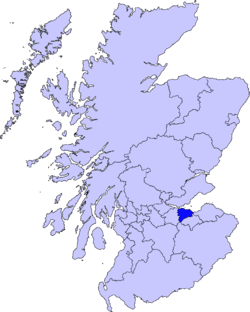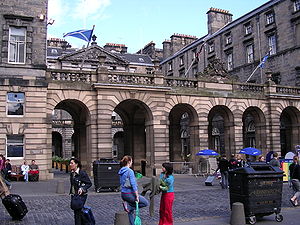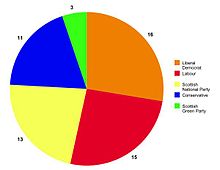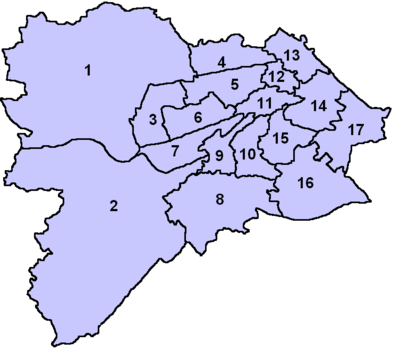- Politics of Edinburgh
-
The City of Edinburgh Council
Ceety o Edinburgh Cooncil
Comhairle Cathair Dhùn Eideann
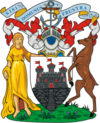
Logo Coat of arms Location Geography Area Ranked 23rd - Total 264 km2 (102 sq mi) Admin HQ Edinburgh ISO 3166-2 GB-EDH ONS code 00QP Demographics Population Ranked 2nd - Total (2005) 486,100 - Density 1,846 / km² Politics The City of Edinburgh Council
http://www.edinburgh.gov.uk/Control Liberal Democrat/Scottish National Party MPs - Michael Crockart, Liberal Democrat
- Alistair Darling, Labour
- Ian Murray, Labour
- Mark Lazarowicz, Labour Co-operative
- Sheila Gilmore, Labour
MSPs - Marco Biagi, Scottish National Party
- Malcolm Chisholm, Labour
- Jim Eadie, Scottish National Party
- Colin Keir, Scottish National Party
- Kenny MacAskill, Scottish National Party
- Gordon MacDonald, Scottish National Party
The politics of Edinburgh, the capital of Scotland, are evident in the deliberations and decisions of the council of Edinburgh, in elections to the council, the Scottish Parliament, the House of Commons and the European Parliament.
Also, as Scotland's capital city, Edinburgh is host to the Scottish Parliament and the main offices of the Scottish Government.
In the European Parliament the city area is within the Scotland constituency, which covers all of the 32 council areas of Scotland.
The City of Edinburgh became a unitary council area in 1996, under the Local Government etc. (Scotland) Act 1994, with the boundaries of the post-1975 City of Edinburgh district of the Lothian region.
As one of the unitary local government areas of Scotland, the City of Edinburgh has a defined structure of governance, generally under the Local Government etc. (Scotland) Act 1994, with The City of Edinburgh Council governing on matters of local administration such as housing, planning, local transport, parks and local economic development and regeneration. For such purposes the City of Edinburgh is divided into 17 wards.
The next tier of government is that of the Scottish Parliament, which legislates on matters of Scottish "national interest", such as healthcare, education, the environment and agriculture, devolved to it by the Parliament of the United Kingdom. For elections to the Scottish Parliament (at the Scottish Parliament Building, in the Holyrood area of Edinburgh), the city area is divided among six Scottish Parliament constituencies, each returning one Member of the Scottish Parliament (MSP), and is within the Lothians electoral region.
The Parliament of the United Kingdom (at the Palace of Westminster) legislates on matters such as taxation, foreign policy, defence, employment and trade. For elections to the House of Commons of this parliament, the city area is divided among five United Kingdom Parliamentary constituencies, with each constituency returning one Member of Parliament (MP) by the first past the post system of election.
Scotland constitutes a single constituency of the European Parliament, in which the electorate of the City of Edinburgh participate in electing six Members of the European Parliament (MEPs) using the d'Hondt method of party-list proportional representation.
Contents
The City of Edinburgh Council
The current Lord Provost of Edinburgh is George Grubb, who replaced Lesley Hinds on May 16, 2007. In Scotland the Lord Provost fulfils many similar roles to that of a Mayor in some other countries.
Elections to the Council are held every four years electing 58 councillors. The last elections took place in May 2007. The Council is currently controlled by a Liberal Democrat/Scottish National Party coalition.
The City of Edinburgh Council, like all other Councils in Scotland, has its powers set out under the terms of the Local Government etc (Scotland) Act 1994.
Full Council
The Full Council comprises all of the 58 elected councillors, and for legal purposes constitutes the Local Authority. The Full Council meets once a month on a Thursday, except during recess and holiday periods and is chaired by the Lord Provost. The Full Council retains complete responsibility for:
- Electing the Lord Provost and Deputy Leader of the Council;
- The delegation of functions to officials including the appointment of the Chief Executive, Chief Officers, members of the Committees and resolving disputes;
- Voting on council rules, ordinances and standing orders;
- Setting the council tax, annual council budget and administering the city's capital investment programme.
In June 2007, The City of Edinburgh Council introduced a streamlined committee structure to replace the former Executive/Scrutiny systems introduced by the Labour administration in 2001. In addition to the full council this includes:
- Policy and Strategy Committee
- 6 Executive Committees
- Audit Committee
Executive Committees
The Council has appointed 13 or 17 members of the Council to its Committees.[1] Listed below are the remits of the Executive Committees:
- Culture and Leisure Committee
- Economic Development Committee
- Education, Children and Families Committee
- Finance and Resources Committee
- Health, Social Care and Housing Committee
- Transport, Infrastructure and Environment Committee
Planning and Regulatory Committees
The Planning Committee is principally concerned with issues of planning and development, including the granting of planning permission and street naming. The Regulatory Committee deals with issues such as health and safety and buildings in need of repair as well as determining individual applications for registration and licensing of food premises, bars, restaurants and entertainment venues under the Civic Government (Scotland) Act 1982 and other statutory powers. Membership of such committees reflects the party balance on the council.
Neighbourhood partnerships
In June 2007 the six local development committees in Edinburgh, one for each Scottish Parliamentary Constituency were replaced by neighbourhood partnerships.[2] Typically these combine the councillors from two council wards with representatives of community councils. Neighbourhood partnerships are tasked with dealing with issues that are specific to their local area and influencing the delivery of key council services including street cleaning, urban parks, libraries, local development, road maintenance, traffic and parking issues. Local committees meet several times each year.
External Committees
The Council also appoints elected members to serve on:
- The Licensing Board
- Lothian and Borders Police Board
- Lothian and Borders Fire and Rescue Board
- Lothian Valuation Joint Board
- Forth Estuary Transport Authority
Elections
Elections to the council are held on a four year cycle, the last being held on Thursday 3 May 2007.
Members of the council represent 17 electoral areas called wards. As a result of the Local Governance (Scotland) Act 2004, multi-member wards were introduced for the 2007 election, each electing three or four councillors by the single transferable vote system, to produce a form of proportional representation. Previously each of 58 wards elected one councillor by the first past the post system of election.
Council political composition
Party Councillors Liberal Democrat 16 Labour 15 Scottish National Party 13 Conservative 11 Scottish Green Party 3 List of wards and councillors
Multi-member wards introduced for the 2007 council election:
Ward Map - Almond (3 members)
- Pentland Hills (3 members)
- Drum Brae/Gyle (3 members)
- Forth (4 members)
- Inverleith (4 members)
- Corstorphine/Murrayfield (3 members)
- Sighthill/Gorgie (4 members)
- Colinton/Fairmilehead (3 members)
- Fountainbridge/Craiglockhart (3 members)
- Meadows/Morningside (4 members)
- City Centre (3 members)
- Leith Walk (4 members)
- Leith (3 members)
- Craigentinny/Duddingston (3 members)
- Southside/Newington (4 members)
- Liberton/Gilmerton (4 members)
- Portobello/Craigmillar (3 members)
Following the local elections on 3 May 2007, the representation on the council was as follows:
Ward Councillors Party Almond George Grubb Liberal Democrat Kate Mackenzie Conservative Norman Work Scottish National Party Pentland Hills Ronald Cairns Scottish National Party Ricky Henderson Labour Alistair S Paisley Conservative Drum Brae/Gyle Robert Aldridge Liberal Democrat Jenny Dawe Liberal Democrat Colin Keir Scottish National Party Forth Steve Cardownie Scottish National Party Allan Jackson Conservative Cammy Day† Labour Elaine Morris††† Scottish National Party Inverleith Lesley Hinds Labour Stuart McIvor Scottish National Party Tim McKay Liberal Democrat Iain Whyte Conservative Corstorphine/Murrayfield Jeremy Balfour Conservative Paul Edie Liberal Democrat Phil Wheeler Liberal Democrat Sighthill/Gorgie Nick Elliott-Cannon Scottish National Party Eric Milligan Labour Joanna Toomey Liberal Democrat Donald Wilson Labour Colinton/Fairmilehead Elaine Aitken Conservative Eric Barry Labour Jason Rust Conservative Fountainbridge/Craiglockhart Andrew Burns Labour Gordon Buchan Conservative Jim Lowrie Liberal Democrat Meadows/Morningside Paul Godzik Labour Alison Johnstone Scottish Green Party Marilyne MacLaren Liberal Democrat Mark McInnes Conservative City Centre Alasdair Rankin†††† Scottish National Party Charles Dundas Liberal Democrat Joanna Mowatt Conservative Leith Walk Angela Blacklock Labour Deidre Brock Scottish National Party Maggie Chapman Scottish Green Party Louise Lang Liberal Democrat Leith Gordon Munro Labour Rob Munn Scottish National Party Marjorie Thomas Liberal Democrat Craigentinny/Duddingston Ewan Aitken Labour Gary Peacock Liberal Democrat Stefan Tymkewycz Scottish National Party Southside/Newington Steve Burgess Scottish Green Party Gordon Mackenzie Liberal Democrat Ian Perry Labour Cameron Rose Conservative Liberton/Gilmerton Tom Buchanan Scottish National Party Norma Hart Labour Bill Cook†† Labour Conor Snowden Liberal Democrat Portobello/Craigmillar Michael Bridgeman Scottish National Party Maureen Child Labour Stephen Hawkins Liberal Democrat Source: The City of Edinburgh Council † Cammy Day replaced Elizabeth Maginnis in November 2008 following a by-election after the death of the latter.
†† Bill Cook replaced Ian Murray following a by-election after Murray's election to Parliament in 2010.
††† Elaine Morris was previously a Liberal Democrat Councillor, but defected to the Scottish National Party in July 2011.
†††† Alasdair Rankin replaced David Beckett following a by-election in August 2011.
Former local government
Prior to the Local Government (Scotland) Act 1973 Edinburgh was administered by the single tier "Edinburgh Corporation", which covered the "City and Royal Burgh of Edinburgh". Edinburgh Corporation was responsible for almost all local government services, such as the Edinburgh Corporation Tramways (which closed in 1956). Midlothian County Council, which had its headquarters on George IV Bridge in Edinburgh, was largely responsible for some local government services in Midlothian (but outside the city boundaries). Some of the towns in Midlothian (such as Dalkeith) also had their own Burgh Council.
In 1975, Edinburgh Corporation and Midlothian County Council were both abolished. The new two-tier system consisted of Lothian Regional Council (with responsibility for water, education, social work and transport) and the City of Edinburgh District Council (with responsibility for cleansing and libraries). The City of Edinburgh became a single-tier council area in 1996, under the Local Government etc. (Scotland) Act 1994, with the boundaries of the City of Edinburgh district of the Lothian region. Confusion between the responsibilities of the Regional and District Councils and the desire for the avoidance of duplication led to the creation of a single tier council. The district had been created in 1975, under the Local Government (Scotland) Act 1973, to include the former county of city of Edinburgh; the former burgh of Queensferry, Kirkliston and part of Winchburgh formerly within the county of West Lothian; and Currie and Cramond formerly within the county of Midlothian.
Parliament of the United Kingdom
For elections to the House of Commons of the Parliament of the United Kingdom, the city is divided among five constituencies, each of which elects one Member of Parliament (MP) by the first past the post system of election. All five constituencies are entirely within the city area.
Prior to the United Kingdom general election, 2005, Edinburgh House of Commons constituencies had exactly the same names and boundaries as the Scottish Parliament constituencies listed above. However, in order to reduce Scotland's historical over representation in the House of Commons, Scotland's share of constituencies was reduced from 72 to 59, in accordance with proposals drawn up by the Boundary Commission for Scotland. The Scottish Parliament (Constituencies) Act 2004 enabled Scottish Parliament constituencies to remain unaltered despite new arrangements for House of Commons constituencies, which resulted in the loss of one Edinburgh constituency and redrawing of boundaries for the others. As a result of the boundary review[3][4]:
- Edinburgh Central constituency was abolished and split between the original Edinburgh North and Leith and Edinburgh West constituencies and an entirely new constituency that was created - Edinburgh South West.
- Edinburgh East and Musselburgh took in parts of the Edinburgh North and Leith seat, with the town of Musselburgh being transferred into the East Lothian constituency, with the new seat renamed Edinburgh East.
- Edinburgh Pentlands constituency was also divided between the new Edinburgh South West seat and the existing Edinburgh South seat.
- Edinburgh North and Leith was increased in size by taking in parts of the old Edinburgh Central constituency.
- Edinburgh South was expanded in size taking in elements of the old Edinburgh Pentlands seat.
- Edinburgh South West was an entirely new constituency created for the 2005 UK general election taking in elements of the old Edinburgh Central seat, the original Edinburgh West seat and Edinburgh Pentlands seat.
- Edinburgh West was expanded to include some parts of the defunct Edinburgh Central seat.
Current political composition:
Party Constituency Member Liberal Democrat Edinburgh West Michael Crockart Labour Edinburgh South West Alistair Darling Labour Edinburgh South Ian Murray Labour Edinburgh North and Leith Mark Lazarowicz Labour Co-operative Edinburgh East Sheila Gilmore Constituencies since 1708
Edinburgh has been used in ten different constituency names since 1708, the date of the first election to the Parliament of Great Britain (which was merged into the Parliament of the United Kingdom in 1801). There have been up to six Edinburgh constituencies at any one time.
Two names, Edinburgh South and Edinburgh West have been in continuous use since 1885. One name, Edinburgh East, also first used in 1885, fell out of use in 1997 and returned to use in 2005.
Survival of a name does not in itself mean that a constituency's boundaries have been unaltered.
Lists of constituencies:
Period Constituencies 1708 to 1885 Edinburgh 1885 to 1918 Edinburgh Central, Edinburgh East, Edinburgh South and Edinburgh West 1918 to 1950 Edinburgh Central, Edinburgh East, Edinburgh Leith, Edinburgh North, Edinburgh South and Edinburgh West 1950 to 1983 Edinburgh Central, Edinburgh East, Edinburgh Leith, Edinburgh North, Edinburgh Pentlands, Edinburgh South and Edinburgh West 1983 to 1997 Edinburgh Central, Edinburgh East, Edinburgh Leith, Edinburgh Pentlands, Edinburgh South and Edinburgh West 1997 to 2005 Edinburgh Central, Edinburgh East and Musselburgh, Edinburgh North and Leith, Edinburgh Pentlands, Edinburgh South and Edinburgh West 2005 to present Edinburgh East, Edinburgh North and Leith, Edinburgh South, Edinburgh South West and Edinburgh West Scottish Parliament
For elections to the Scottish Parliament, the city is divided among six of the nine constituencies in the Lothians electoral region. Each constituency elects one Member of the Scottish Parliament (MSP) by the first past the post system of election, and the region elects seven additional members (also called MSPs) to produce a form of proportional representation.
One of the Edinburgh constituencies includes Musselburgh, which is outside the city, in East Lothian.
Until the United Kingdom general election, 2005, Edinburgh Scottish Parliament and Parliament of the United Kingdom constituencies were coterminous (shared the same geographical boundaries). The Scottish Parliament (Constituencies) Act 2004, a piece of United Kingdom Parliament legislation, had removed the link, to enable Scottish Parliament constituencies to retain established boundaries despite the introduction of new boundaries for United Kingdom Parliament constituencies.
In the 2011 Scottish Parliament election, the six Edinburgh constituencies elected five Scottish National Party MSPs and one Labour MSP:
Party Constituency Member Scottish National Party Edinburgh Central Marco Biagi Labour Edinburgh Northern and Leith Malcolm Chisholm Scottish National Party Edinburgh Eastern Kenny MacAskill Scottish National Party Edinburgh Pentlands Gordon MacDonald Scottish National Party Edinburgh Southern Jim Eadie Scottish National Party Edinburgh Western Colin Keir The following additional members were elected to represent the Lothians electoral region:
Party Member Labour Sarah Boyack Conservative David McLetchie Labour Kezia Dugdale Scottish Green Party Alison Johnstone Independent Margo MacDonald Labour Neil Findlay Conservative Gavin Brown See also
- List of Lord Provosts of Edinburgh
- Scottish Parliament (Constituencies) Act 2004
- Lothian Regional Council
Footnotes
- ^ [1]
- ^ [2]
- ^ BBC News 2002 Political landscape set to change
- ^ Boundary Commission for Scotland, 2004 Fifth Periodical Review of Constituencies
External links
- The City of Edinburgh Council
- The City of Edinburgh Council - How the Council Works
- CityMayors feature
- Your Edinburgh
- Edinburgh City Local Plan
- Scottish Parliament
- United Kingdom Parliament
- Local Government etc. (Scotland) Act 1994
Council areas of Scotland Aberdeen · Aberdeenshire · Angus · Argyll and Bute · Clackmannanshire · Dumfries and Galloway · Dundee · East Ayrshire · East Dunbartonshire · East Lothian · East Renfrewshire · Edinburgh · Falkirk · Fife · Glasgow · Highland · Inverclyde · Midlothian · Moray · Na h-Eileanan Siar (Western Isles) · North Ayrshire · North Lanarkshire · Orkney · Perth and Kinross · Renfrewshire · Scottish Borders · Shetland · South Ayrshire · South Lanarkshire · Stirling · West Dunbartonshire · West Lothian
Categories:- Politics of Edinburgh
- Local authorities of Scotland
Wikimedia Foundation. 2010.

